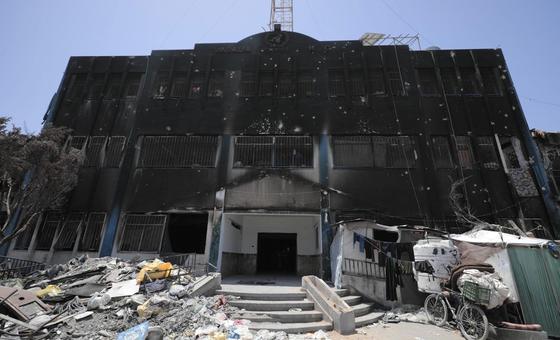The World Health Organization (WHO) has registered more than 1,000 attacks on healthcare facilities in the Occupied Palestinian Territory since the October 7 terror attacks in Israel sparked the on-going war in Gaza, the agency’s top official in the region said on Wednesday.
In a press briefing, Dr. Rik Peeperkorn, WHO representative for the West Bank and Gaza, told journalists there are currently no functional hospitals in the enclave’s southernmost city of Rafah, following Israel’s recent offensive there.
The availability of hospital beds has drastically declined, dropping from 3,500 before the conflict erupted, to just 1,400 today, he added.
He said 600 of those 1,400 are being provided by field hospitals “so currently from the Ministry of Health and NGO fixed hospitals, there’s only 800 hospital beds in service from the 3,500, plus 600 field hospital beds, for a population of 2.2 million people”.
The WHO official also highlighted the urgency of allowing critically ill patients to leave Gaza, stating that around 10,000 patients still require urgent evacuation, half of whom are suffering from severe trauma – including spinal injuries and amputations.
Despite the readiness of hospitals in the West Bank and East Jerusalem to accept patients – along with neighbouring countries – safe corridors for evacuation are essential, he underlined: firstly, to the West Bank and East Jerusalem, secondly, to Egypt via Rafah, with Jordan as a third option.
Many countries have offered medical evacuation services Dr Peeperkorn added. “Don’t let politics stand in the way of life-saving care for patients who are in critical condition,” he pleaded.
Entire population traumatised
The mental health crisis in Gaza is also of significant concern, affecting all 2.2 million residents and humanitarian workers.
“It’s about children…It’s about adolescents. It’s about women. It’s about men. It’s about the elderly. It’s about health workers. It’s about first responders…No one is not affected by what happened, and this also will require special attention in the early recovery and rehabilitation,” Dr Peeperkorn emphasised.
Stop targeting schools
In another development, Philippe Lazzarini, head of the UN agency assisting Palestinians (UNRWA), reported that attacks on schools in Gaza have become an almost daily occurrence.
There have been “at least eight schools hit in the last 10 days, including six UNRWA schools” he said in a post on X. “The war robbed the girls and boys in Gaza of their childhood and education”.
He added that schools must never be used for fighting or military purposes by any party to the conflict.
“Schools are not a target,” he emphasised.

